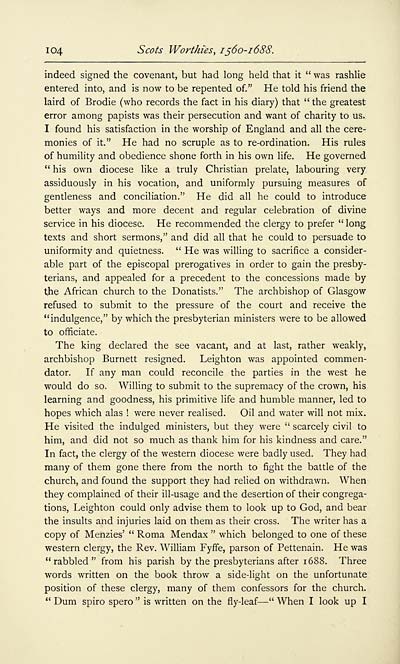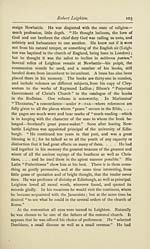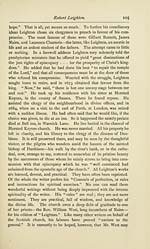Scots worthies, 1560-1688
(124) Page 104
Download files
Complete book:
Individual page:
Thumbnail gallery: Grid view | List view

104 Scots Worthies, i 560-1688.
indeed signed the covenant, but had long held that it " was rashlie
entered into, and is now to be repented of." He told his friend the
laird of Brodie (who records the fact in his diary) that " the greatest
error among papists was their persecution and want of charity to us.
I found his satisfaction in the worship of England and all the cere-
monies of it." He had no scruple as to re-ordination. His rules
of humility and obedience shone forth in his own life. He governed
" his own diocese like a truly Christian prelate, labouring very
assiduously in his vocation, and uniformly pursuing measures of
gentleness and conciliation." He did all he could to introduce
better ways and more decent and regular celebration of divine
service in his diocese. He recommended the clergy to prefer " long
texts and short sermons," and did all that he could to persuade to
uniformity and quietness. " He was willing to sacrifice a consider-
able part of the episcopal prerogatives in order to gain the presby-
terians, and appealed for a precedent to the concessions made by
the African church to the Donatists." The archbishop of Glasgow
refused to submit to the pressure of the court and receive the
"indulgence," by which the presbyterian ministers were to be allowed
to officiate.
The king declared the see vacant, and at last, rather weakly,
archbishop Burnett resigned. Leighton was appointed commen-
dator. If any man could reconcile the parties in the west he
would do so. Willing to submit to the supremacy of the crown, his
learning and goodness, his primitive life and humble manner, led to
hopes which alas ! were never realised. Oil and water will not mix.
He visited the indulged ministers, but they were " scarcely civil to
him, and did not so much as thank him for his kindness and care."
In fact, the clergy of the western diocese were badly used. They had
many of them gone there from the north to fight the battle of the
church, and found the support they had relied on withdrawn. When
they complained of their ill-usage and the desertion of their congrega-
tions, Leighton could only advise them to look up to God, and bear
the insults and injuries laid on them as their cross. The writer has a
copy of Menzies' " Roma Mendax " which belonged to one of these
western clergy, the Rev. William Fyffe, parson of Pettenain. He was
"rabbled" from his parish by the presbyterians after 1688. Three
words written on the book throw a side-light on the unfortunate
position of these clergy, many of them confessors for the church.
" Dum spiro spero " is written on the fly-leaf — " When I look up I
indeed signed the covenant, but had long held that it " was rashlie
entered into, and is now to be repented of." He told his friend the
laird of Brodie (who records the fact in his diary) that " the greatest
error among papists was their persecution and want of charity to us.
I found his satisfaction in the worship of England and all the cere-
monies of it." He had no scruple as to re-ordination. His rules
of humility and obedience shone forth in his own life. He governed
" his own diocese like a truly Christian prelate, labouring very
assiduously in his vocation, and uniformly pursuing measures of
gentleness and conciliation." He did all he could to introduce
better ways and more decent and regular celebration of divine
service in his diocese. He recommended the clergy to prefer " long
texts and short sermons," and did all that he could to persuade to
uniformity and quietness. " He was willing to sacrifice a consider-
able part of the episcopal prerogatives in order to gain the presby-
terians, and appealed for a precedent to the concessions made by
the African church to the Donatists." The archbishop of Glasgow
refused to submit to the pressure of the court and receive the
"indulgence," by which the presbyterian ministers were to be allowed
to officiate.
The king declared the see vacant, and at last, rather weakly,
archbishop Burnett resigned. Leighton was appointed commen-
dator. If any man could reconcile the parties in the west he
would do so. Willing to submit to the supremacy of the crown, his
learning and goodness, his primitive life and humble manner, led to
hopes which alas ! were never realised. Oil and water will not mix.
He visited the indulged ministers, but they were " scarcely civil to
him, and did not so much as thank him for his kindness and care."
In fact, the clergy of the western diocese were badly used. They had
many of them gone there from the north to fight the battle of the
church, and found the support they had relied on withdrawn. When
they complained of their ill-usage and the desertion of their congrega-
tions, Leighton could only advise them to look up to God, and bear
the insults and injuries laid on them as their cross. The writer has a
copy of Menzies' " Roma Mendax " which belonged to one of these
western clergy, the Rev. William Fyffe, parson of Pettenain. He was
"rabbled" from his parish by the presbyterians after 1688. Three
words written on the book throw a side-light on the unfortunate
position of these clergy, many of them confessors for the church.
" Dum spiro spero " is written on the fly-leaf — " When I look up I
Set display mode to:
![]() Universal Viewer |
Universal Viewer | ![]() Mirador |
Large image | Transcription
Mirador |
Large image | Transcription
Images and transcriptions on this page, including medium image downloads, may be used under the Creative Commons Attribution 4.0 International Licence unless otherwise stated. ![]()
| Histories of Scottish families > Scots worthies, 1560-1688 > (124) Page 104 |
|---|
| Permanent URL | https://digital.nls.uk/95152514 |
|---|
| Description | A selection of almost 400 printed items relating to the history of Scottish families, mostly dating from the 19th and early 20th centuries. Includes memoirs, genealogies and clan histories, with a few produced by emigrant families. The earliest family history goes back to AD 916. |
|---|

